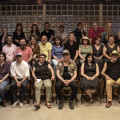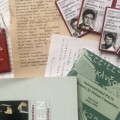To what extent do you consider the First Artsakh War to be sufficiently reflected in Armenian literature?
The response to the First Artsakh War in our literature presents a strange case. Perhaps we did not know how to talk about victory or how to speak from a position of strength. Yes, we do have literature that covers the first war, but most of it does not consist of writings about victory. It is about the negative sides of war, the ugly and painful face of it, it is a literature of human tragedy. I only realize now that I have been raised without the reinforcing knowledge in my mind of how exceptional and grand that victory had been. I’m not talking about not knowing the facts or historical occurrences that unfolded, but about how those should have resonated in our blood. The Genocide and the Turks have a more decisive and central role in the education and literature I have been offered than Artsakh, our victory, and the Azerbaijanis. I am not afraid to be personally open about this, but you should imagine that a whole generation has also gone through the same. I am not looking at this and analyzing it as a person of literature. I’m not speaking from the position of a person that has tried to find new meaning in all this at an older age. I’m answering this question through the eyes of a young person sitting at a desk in school, loving Armenian literature as a subject.
Before the Second Artsakh War, there were mutual visits and some contact at the level of non-governmental organizations and people-to-people diplomacy between Armenians and Azerbaijanis as well as Armenians and Turks. In your opinion, why was none of this able to plant the seeds of tolerance among the Turk and Azerbaijani people, why were they unable to reject this xenophobia?
This was just a drop in the ocean. Mutual understanding between a few hundred people cannot lead to a change in attitudes or to any kind of tangible impact. I have personally worked for three years in Armenia-Turkey relationship-building programs. I have welcomed various groups from Turkey here and sent several delegations from Armenia. I’ve also been to Turkey on a business trip. During the war, I was expecting messages to arrive from my Turkish friends. I thought that we had broken bread together, shared jokes, worked productively. Some of them were indifferent, but there were also those that enjoyed our suffering. Some were secretly worried but were afraid to openly show compassion, though they did display signs of understanding. I was convinced that, in any case, very few individuals were ready to think, feel or act independently. It is always easier to join the crowd, it is safer in a herd. And the crowd did not participate in those mutual visits – they were actually completely oblivious to their occurrence.
Can a writer’s words and text play a role in peacebuilding initiatives and succeed? Will these words be understood and accepted?
I find it difficult to imagine what role they could play, and particularly how they could succeed. But they must do something. There is also another “but” here. Peace must be offered by the strong side, the victorious side. The peace that comes from the losing side, as a rule, is simply a case of conciliation and pity. I don’t want us to initiate that kind of peace. Our peace should be a story of growing stronger, educating ourselves, becoming more ambitious, and speaking on equal terms. At this moment, I think that the first thing we need to do is offer peace within ourselves, to find peace of mind but not to silence the storm in our souls, because our souls have been sleeping for a very long time.



